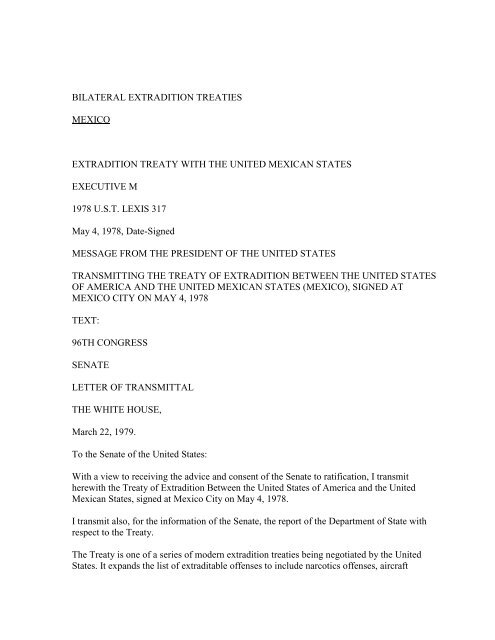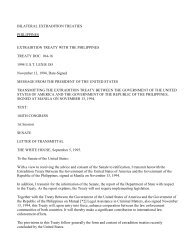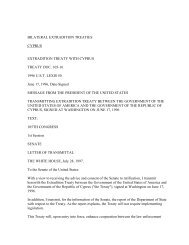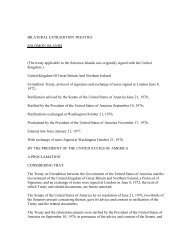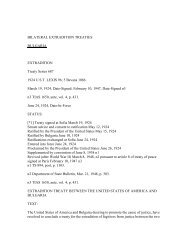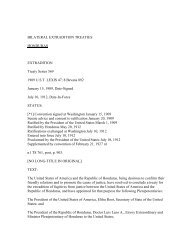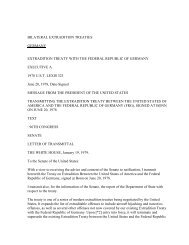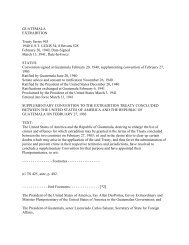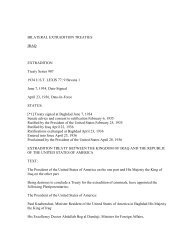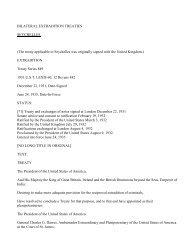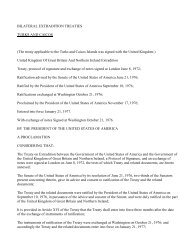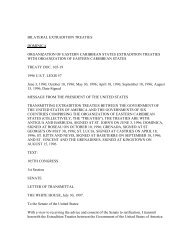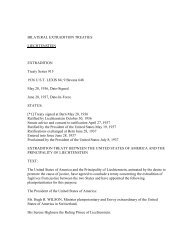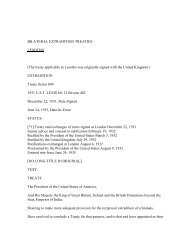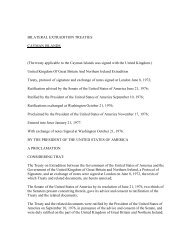BILATERAL EXTRADITION TREATIES MEXICO EXTRADITION ...
BILATERAL EXTRADITION TREATIES MEXICO EXTRADITION ...
BILATERAL EXTRADITION TREATIES MEXICO EXTRADITION ...
You also want an ePaper? Increase the reach of your titles
YUMPU automatically turns print PDFs into web optimized ePapers that Google loves.
<strong>BILATERAL</strong> <strong>EXTRADITION</strong> <strong>TREATIES</strong><strong>MEXICO</strong><strong>EXTRADITION</strong> TREATY WITH THE UNITED MEXICAN STATESEXECUTIVE M1978 U.S.T. LEXIS 317May 4, 1978, Date-SignedMESSAGE FROM THE PRESIDENT OF THE UNITED STATESTRANSMITTING THE TREATY OF <strong>EXTRADITION</strong> BETWEEN THE UNITED STATESOF AMERICA AND THE UNITED MEXICAN STATES (<strong>MEXICO</strong>), SIGNED AT<strong>MEXICO</strong> CITY ON MAY 4, 1978TEXT:96TH CONGRESSSENATELETTER OF TRANSMITTALTHE WHITE HOUSE,March 22, 1979.To the Senate of the United States:With a view to receiving the advice and consent of the Senate to ratification, I transmitherewith the Treaty of Extradition Between the United States of America and the UnitedMexican States, signed at Mexico City on May 4, 1978.I transmit also, for the information of the Senate, the report of the Department of State withrespect to the Treaty.The Treaty is one of a series of modern extradition treaties being negotiated by the UnitedStates. It expands the list of extraditable offenses to include narcotics offenses, aircraft
hijacking, bribery, and obstruction of justice, as well as many other offenses not now coveredby our existing Extradition Treaty with Mexico. [*2] Upon entry into force, it will terminateand supersede the existing Extradition Treaty and Additional Conventions between theUnited States and Mexico.This Treaty will make a significant contribution to international cooperation in lawenforcement. I recommend that the Senate give early and favorable considerations to theTreaty and give its advice and consent to ratification.JIMMY CARTER.LETTER OF SUBMITTALDEPARTMENT OF STATE,Washington, D.C., March 5, 1979.The PRESIDENT,The White House.THE PRESIDENT: I have the honor to submit to you the Extradition Treaty Between theUnited States of America and the United Mexican States (Mexico), signed at Mexico City onMay 4, 1978. I recommend that the treaty be transmitted to the Senate for its advice andconsent to ratification.This treaty follows generally the form and content of extradition treaties recently concludedby this Government. The treaty provides for the extradition of fugitives who have beencharged with or convicted of any of thirty-one offenses listed in the schedule annexed to thetreaty. Significant newly-listed offenses, which are not in our existing treaty with Mexico,include those relating to narcotics, [*3] aircraft hijacking, * and obstruction of justice.- - - - - - - - - - - - - - - - - -Footnotes- - - - - - - - - - - - - - - - - -* Both Mexico and the United States are parties to multilateral conventions which in effectamend the existing bilateral treaty to include these offenses.- - - - - - - - - - - - - - - - -End Footnotes- - - - - - - - - - - - - - - - -Article 1 includes a new jurisdictional provision which allows for extradition where theoffense has been committed outside the territory of the requesting State by a national of thatState.Crimes committed outside the territory of the requesting State may also provide the basis forextradition if the offense so committed would also be punishable under the law of therequested State in similar circumstances. Like provisions are contained in U.S. extradition
een included in most recent treaties.Article [*6] 9 deals with the extradition of nationals. It is similar to provisions in some of ourother recently signed extradition treaties. It grants the executive the discretionary power toextradite its own nationals. If extradition is denied on the basis of nationality, the requestedParty undertakes to submit the case to its competent authorities for the purpose ofprosecution, provided that Party has jurisdiction over the offense. This article thus takes intoaccount the law of Mexico prohibiting the extradition of its nationals but allowing for theirprosecution in Mexico for offenses committed abroad.Articles 10-21 autline the procedures by which extradition shall be accomplished. Article 21provides that the requesting Party shall pay the costs associated with the transportation of theperson sought and with the translation of extradition documents. This article also providesthat the requested Party shall bear the expense of the arrangements referred to in Article 13.The latter article provides, among other things, that the requested Party shall make allarrangements necessary for internal extradition procedures and employ all legal means toobtain from the judicial authorities the [*7] decisions necessary to perfect the extraditionrequest. We expect to continue the present practice under which each country is representedin extradition proceedings by the other's Justice Department.Article 22 provides that the treaty is retroactive in effect as to extraditable offenses whichwere committed before the date of entry into force and which were punishable under the lawsof both Parties when committed.Article 23 provides that the treaty will enter into force on the date of exchange of theinstruments of ratification. Upon entry into force, this treaty will terminate the Treaty ofExtradition between the United States and Mexico, signed on February 22, 1899, and theAdditional Conventions on Extradition signed on June 25, 1902, December 23, 1925, andAugust 16, 1939.The Department of Justice joins the Department of State in favoring approval of this treaty bythe Senate at an early date.Respectfully submitted.CYRUS VANCE.<strong>EXTRADITION</strong> TREATY BETWEEN THE UNITED STATES OF AMERICA AND THEUNITED MEXICAN STATESThe Government of the United States of America and the Government of the United MexicanStates;Desiring to cooperate more closely in the fight against crime and, [*8] to this end, to
mutually render better assistance in matters of extradition;Have agreed as follows:ARTICLE 1Obligation To Extradite1. The Contracting Parties agree to mutually extradite, subject to the provisions of thisTreaty, persons who the competent authorities of the requesting Party have charged with anoffense or have found guilty of committing an offense, or are wanted by said authorities tocomplete a judicially pronounced penalty of deprivation of liberty for an offense committedwithin the territory of the requesting Party.2. For an offense committed outside the territory of the requesting Party, the requested Partyshall grant extradition if:(a) its laws would provide for the punishment of such an offense committed in similarcircumstances, or(b) the person sought is a national of the requesting Party, and that Party has jurisdictionunder its own laws to try that person.ARTICLE 2Extraditable Offenses1. Extradition shall take place, subject to this Treaty, for wilful acts which fall within any ofthe clauses of the Appendix and are punishable in accordance with the laws of bothContracting Parties by deprivation of liberty the maximum of [*9] which shall not be lessthan one year.2. If extradition is requested for the execution of a sentence, there shall be the additionalrequirement that the part of the sentence remaining to be served shall not be less than sixmonths.3. Extradition shall also be granted for wilful acts which, although not being included in theAppendix, are punishable, in accordance with the federal laws of both Contracting Parties, bya deprivation of liberty the maximum of which shall not be less than one year.4. Subject to the conditions established in paragraphs 1, 2 and 3, extradition shall also begranted:(a) For an attempt to commit an offense: conspiracy to commit an offense; or theparticipation in the execution of an offense; or
(b) When, for the purpose of granting jurisdiction to the United States government,transportation of persons or property, the use of the mail or other means of carrying outinterstate or foreign commerce, is also an element of the offense.ARTICLE 3Evidence RequiredExtradition shall be granted only if the evidence be found sufficient, according to the laws ofthe requested Party, either to justify the committal for trial of the person sought if [*10] theoffense of which he has been accused had been committed in that place or to prove that he isthe person convicted by the courts of the requesting Party.ARTICLE 4Territorial Application1. For the purposes of this Treaty, the territory of a Contracting Party shall include all theterritory under the jurisdiction of that Contracting Party, including airspace and territorialwaters and vessels and aircraft registered in that Contracting Party if any such aircraft is inflight when the offense is committed.2. For the purposes of this Treaty, an aircraft shall be considered to be in flight at any timefrom the moment when all its external doors are closed following the embarkation until themoment when any such door is opened for disembarkation.ARTICLE 5Political and Military Offenses1. Extradition shall not be granted when the offense for which it is requested is political or ofa political character.If any question arises as to the application of the foregoing paragraph, the Executive authorityof the requested Party shall decide.2. For the purpose of this Treaty, the following offenses shall not be considered to beoffenses included in paragraph 1:(a) The [*11] murder or other wilful crime against the life or physical integrity of a Head ofState or Head of Government or of his family, including attempts to commit such an offense.(b) An offense which the Contracting Parties may have the obligation to prosecute by reasonof a multilateral international agreement.3. Extradition shall not be granted when the offense for which extradition is requested is a
purely military offense.ARTICLE 6Non bis in idemExtradition shall not be granted when the person sought has been prosecuted or has been triedand convicted or acquitted by the requested Party for the offense for which extradition isrequested.ARTICLE 7Lapse of TimeExtradition shall not be granted when the prosecution or the enforcement of the penalty forthe offense for which extradition has been sought has become barred by lapse of timeaccording to the laws of the requesting or requested Party.ARTICLE 8Capital PunishmentWhen the offense for which extradition is requested is punishable by death under the laws ofthe requesting Party and the laws of the requested Party do not permit such punishment forthat offense, extradition may be refused unless the requesting [*12] Party furnishes suchassurances as the requested Party considers sufficient that the death penalty shall not beimposed, or, if imposed, shall not be executed.ARTICLE 9Extradition of Nationals1. Neither Contracting Party shall be bound to deliver up its own nationals, but the executiveauthority of the requested Party shall, if not prevented by the laws of that Party, have thepower to deliver them up if, in its discretion, it be deemed proper to do so.2. If extradition is not granted pursuant to paragraph 1 of this Article, the requested Partyshall submit the case to its competent authorities for the purpose of prosecution, provided thatParty has jurisdiction over the offense.ARTICLE 10Extradition Procedures and Required Documents1. The request for extradition shall be made through the diplomatic channel.
2. The request for extradition shall contain the description of the offense for whichextradition is requested and shall be accompanied by:(a) A statement of the facts of the case;(b) The text of the legal provisions describing the essential elements of the offense;(c) The text of the legal provisions describing the punishment for the offense;( [*13] d) The text of the legal provisions relating to the time limit on the prosecution or theexecution of the punishment of the offense;(e) The facts and personal information of the person sought which will permit hisidentification and, where possible, information concerning his location.3. In addition, when the request for extradition relates to a person who has not yet beenconvicted, it shall be accompanied by:(a) A certified copy of the warrant of arrest issued by a judge or other judicial officer of therequesting Party;(b) Evidence which, in accordance with the laws of the requested Party, would justify theapprehension and commitment for trial of the person sought if the offense had beencommitted there.4. When the request for extradition relates to a convicted person, it shall be accompanied by acertified copy of the judgment of conviction imposed by a court of the requesting Party.If the person was found guilty but not sentenced, the extradition request shall be accompaniedby a certification to that effect and a certified copy of the warrant of arrest.If such person has already been sentenced, the request for extradition shall be accompaniedby [*14] a certification of the sentence imposed and a statement indicating which part of thesentence has not been carried out.5. All the documents that must be presented by the requesting Party in accordance with theprovisions of this Treaty shall be accompanied by a translation in the language of therequested Party.6. The documents which, according to this Article, shall accompany the request forextradition, shall be received in evidence when:(a) In the case of a request emanating from the United States, they are authenticated by theofficial seal of the Department of State and legalized by the manner prescribed by theMexican law;
ARTICLE 14Decision and Surrender1. The requested Party shall promptly communicate to the requesting Party its decision on therequest for extradition.2. In the case of complete or partial rejection of a request for extradition, the requested Partyshall give the reasons on which it was based.3. If the extradition is granted, the surrender of the person sought shall take place within suchtime as may be prescribed by the laws of the requested Party. The competent authorities ofthe Contracting Parties shall agree on the date and place of the surrender of the personsought.4. If the competent authority has issued the warrant or order for the extradition of the personsought and he is not removed from the territory of the requested Party within the prescribed[*17] period, he shall be set at liberty and the requested Party may subsequently refuse toextradite him for the same offense.ARTICLE 15Delayed SurrenderThe requested Party, after granting the extradition, may defer the surrender of the personsought when that person is being proceeded against or is serving a sentence in the territory ofthe requested Party for a different offense, until the conclusion of the proceeding or the fullexecution of the punishment that has been imposed.ARTICLE 16Requests for extradition made by Third StatesThe requested Party, in the case of receiving requests from the other Contracting Party andfrom one or more third States for the extradition of the same person, be it for the sameoffense or for different offenses, shall decide to which requesting State it shall grant theextradition of that person.ARTICLE 17Rule of Speciality1. A person extradited under the present Treaty shall not be detained, tried or punished in theterritory of the requesting Party for an offense other than that for which extradition has beengranted nor be extradited by that Party to a third State unless:
(a) He has left the territory of the requesting Party [*18] after his extradition and hasvoluntarily returned to it;(b) He has not left the territory of the requesting Party within 60 days after being free to doso; or(c) The requested Party has given its consent to his detention, trial, punishment or extraditionto a third State for an offense other than that for which the extradition was granted. Thesestipulations shall not apply to offenses committed after the extradition.2. If, in the course of the procedure, the classification of the offense is changed for which theperson requested was extradited, he shall be tried and sentenced on the condition that theoffense, in its new legal form:(a) Is based on the same group of facts established in the request for extradition and in thedocuments presented in its support; and(b) Is punishable with the same maximum sentence as the crime for which he was extraditedor with a lesser sentence.ARTICLE 18Summary ExtraditionIf the person sought informs the competent authorities of the requested Party that he agrees tobe extradited, that Party may grant his extradition without further proceedings, and shall takeall measures permitted under its laws to expedite the [*19] extradition. In such cases Article17 shall not be applicable.ARTICLE 19Surrender of Property1. To the extent permitted under the law of the requested Party and subject to the rights ofthird parties, which shall be duly respected, in articles, instruments, objects of value ordocuments relating to the offense, whether or not used for its execution, or which in any othermanner may be material evidence for the prosecution, shall be surrendered upon the grantingof the extradition even when extradition cannot be effected due to the death, disappearance,or escape of the accused.2. The requested Party may condition the surrender of articles upon a satisfactory assurancefrom the requesting Party that the articles will be returned to the requested Party as soon aspossible.ARTICLE 20
Transit1. The right to transport through the territory of one of the Contracting Parties a person whois not a national of that Contracting Party surrendered to the other Contracting Party by athird State shall be granted on presentation made through the diplomatic channel of acertified copy of the decision on extradition, provided that reasons of public order are notopposed to the transit. [*20]2. The authorities of the transit State shall be in charge of the custody of the extradited personwhile that person is in its territory.3. The Party to which the person has been extradited shall reimburse the State through whoseterritory such person is transported for any expenses incurred by the latter in connection withsuch transportation.ARTICLE 21ExpensesThe requested Party shall bear the expenses of the arrangements referred to in Article 13,with the exception that the expenses incurred for the translation of documents and, ifapplicable, for the transportation of the person ordered extradited shall be paid by therequesting Party.ARTICLE 22Scope of Application1. This Treaty shall apply to offenses specified in Article 2 committed before and after thisTreaty enters into force.2. Requests for extradition that are under process on the date of the entry into force of thisTreaty, shall be resolved in accordance with the provisions of the Treaty of 22 February,1899, and the Additional Conventions on Extradition of 25 June 1902, 23 December 1925,and 16 August 1939.ARTICLE 23Ratification, Entry into Force, Denunciation1. This Treaty shall be subject to [*21] ratification; the exchange of instruments in ratificationshall take place in Washington as soon as possible.2. This Treaty shall enter into force on the date of exchange of the instruments of ratification.
3. On entry into force of this Treaty, the Treaty of Extradition of 22 February 1899 and theAdditional Conventions on Extradition of 25 June 1902, 23 December 1925 and 16 August1939 between the United States of America and the United Mexican States, shall cease tohave effect without prejudice to the provisions of Article 22.4. Either Contracting Party may terminate this Treaty by giving notice to the other Party. Thetermination shall take effect six months after the receipt of such notice.DONE IN TWO ORIGINALS, in the English and Spanish languages, both equally authentic,at Mexico City this fourth day of May, one thousand nine hundred seventy-eight.FOR THE GOVERNMENT OF THE UNITED STATES OF AMERICA:CYRUS VANCE.FOR THE GOVERNMENT OF THE UNITED MEXICAN STATES:S. ROEL.APPENDICES:APPENDIX1. Murder or manslaughter; abortion.2. Malicious wounding or injury.3. Abandonment of minors or other dependents when there is danger of injury or death.4. Kidnapping; child stealing; abduction; [*22] false imprisonment.5. Rape; statutory rape; indecent assault; corruption of minors, including unlawful sexual actswith or upon children under the age of consent.6. Procuration; promoting or facilitating prostitution.7. Robbery; burglary; larceny.8. Fraud.9. Embezzlement.10. An offense against the laws relating to counterfeiting and forgery.11. Extortion.
12. Receiving or transporting any money, valuable securities, or other property knowing thesame to have been unlawfully obtained.13. Arson; malicious injury to property.14. Offenses against the laws relating to the traffic in, possession, production, manufacture,importation or exportation of dangerous drugs and chemicals, including narcotic drugs,cannabis, psychotropic drugs, opium, cocaine, or their derivatives.15. Offenses against the laws relating to the control of poisonous chemicals or substancesinjurious to health.16. Piracy.17. Offenses against the safety of means of transportation including any act that wouldendanger a person in a means of transportation.18. An offense relating to unlawful seizure or exercise of control of trains, aircraft, vessels, orother means of transportation.19. Offenses against [*23] the laws relating to prohibited weapons, and the control offirearms, ammunition, explosives, incendiary devices or nuclear materials.20. An offense against the laws relating to international trade and transfers of funds orvaluable metals.21. An offense against the laws relating to the importation, exportation, or internationaltransit of goods, articles, or merchandise, including historical or archeological items.22. Violations of the customs laws.23. Offenses against the laws relating to the control of companies, banking institutions orother corporations.24. Offenses against the laws relating to the sale of securities, including stocks, bonds andinstruments of credit.25. Offenses against the laws relating to bankruptcy or rehabilitation of a corporation.26. Offenses against the laws relating to prohibition of monopoly or unfair transactions.27. Offenses against the laws relating to protection of industrial property or copyright.28. Offenses against the laws relating to abuse of official authority.29. Bribery, including soliciting, offering and accepting bribes.
30. Perjury; false statements to any governmental authority. Subornation of perjury or falsestatements.31. [*24] Offenses against the laws relating to obstruction of justice including harboringcriminals and suppressing evidence.


